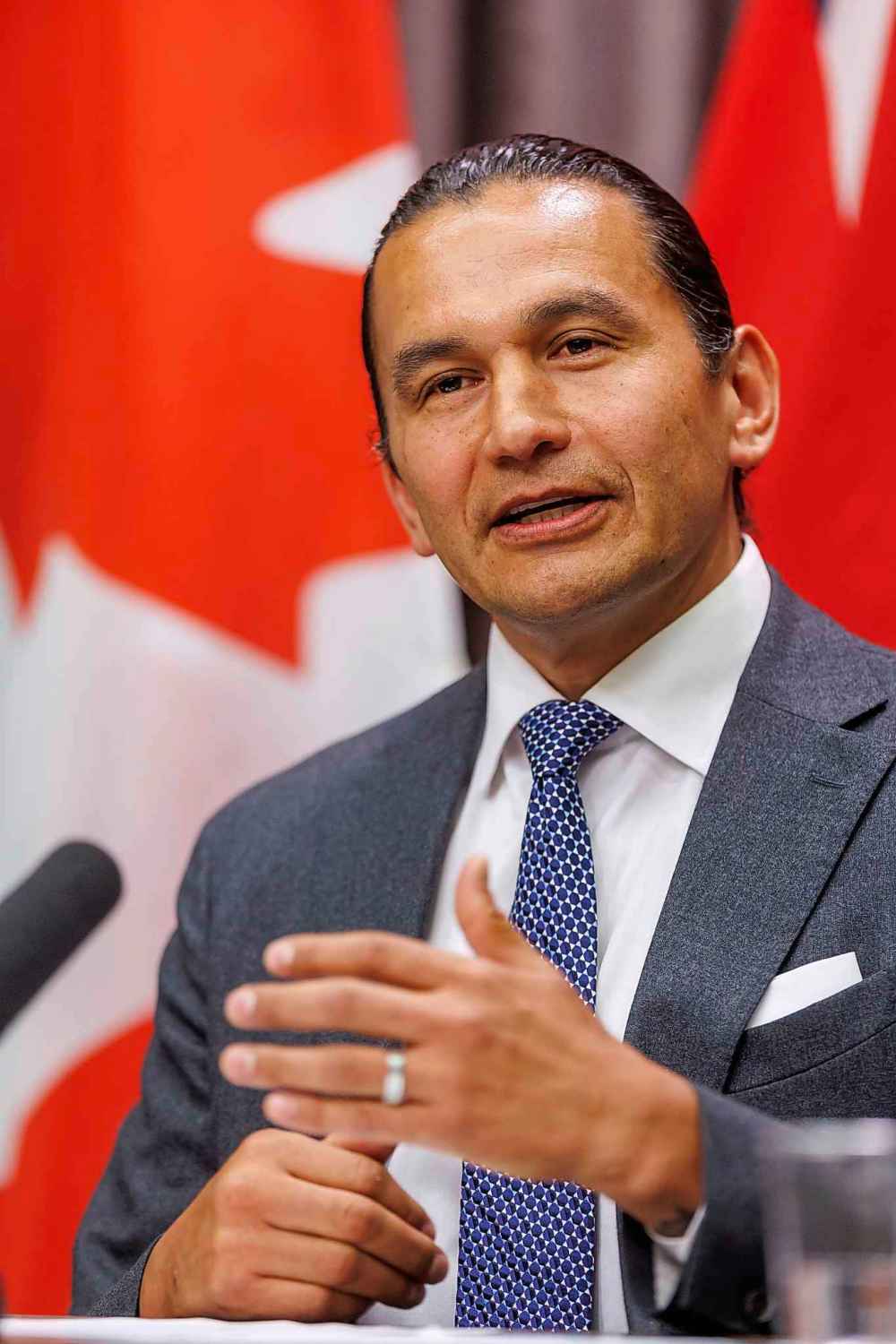Premier steadfastly behind big energy projects in face of criticism
Advertisement
Read this article for free:
or
Already have an account? Log in here »
To continue reading, please subscribe:
Monthly Digital Subscription
$1 per week for 24 weeks*
- Enjoy unlimited reading on winnipegfreepress.com
- Read the E-Edition, our digital replica newspaper
- Access News Break, our award-winning app
- Play interactive puzzles
*Billed as $4.00 plus GST every four weeks. After 24 weeks, price increases to the regular rate of $19.00 plus GST every four weeks. Offer available to new and qualified returning subscribers only. Cancel any time.
Monthly Digital Subscription
$4.75/week*
- Enjoy unlimited reading on winnipegfreepress.com
- Read the E-Edition, our digital replica newspaper
- Access News Break, our award-winning app
- Play interactive puzzles
*Billed as $19 plus GST every four weeks. Cancel any time.
To continue reading, please subscribe:
Add Free Press access to your Brandon Sun subscription for only an additional
$1 for the first 4 weeks*
*Your next subscription payment will increase by $1.00 and you will be charged $16.99 plus GST for four weeks. After four weeks, your payment will increase to $23.99 plus GST every four weeks.
Read unlimited articles for free today:
or
Already have an account? Log in here »
Minutes after declaring the second wildfire state of emergency this summer, Premier Wab Kinew stood by his support for the development of an energy corridor through Manitoba, even as the climate crisis forces thousands to flee their homes.
“If we want a stronger ability to be climate resilient in the future, we’ve got to pay the bills,” Kinew said at the wildfire briefing Thursday.
“If we want stronger health care and education, we’ve got to have the hard hats building big projects,” said the premier.

Kinew has promoted “nation-building projects” such as a proposal by Fox Lake Cree Nation that has received temporary federal approval to look at exporting liquefied natural gas to Europe from Port Nelson on Hudson Bay in northern Manitoba.
Manitoba’s first Indigenous premier came under fire in a Globe and Mail opinion piece Saturday headlined Wab Kinew’s development dreams threaten our people’s way of life, which was written by author, environmentalist and Mathias Colomb Cree Nation member Clayton Thomas-Müller.
“I was a little amused to see that headline while I was on a sundance ceremony over the weekend,” Kinew said Thursday.
Thomas-Müller wrote it was “jarring and triggering” to hear a fellow Indigenous person promoting an energy and trade corridor to ship fossil fuels during the climate crisis.
When asked how in good conscience he could support big energy projects as Manitoba burns, Kinew fired back.
“Every fire engine that I’ve seen, every flight carrying an evacuee, every chainsaw that a firefighter is using during this wildfire season has been powered with conventional energies,” the premier said, adding fossil fuels will be a part of life for the foreseeable future.
“This is who we are today and there is definitely a path forward to be able to develop our economy while still practising our way of life — whether we’re talking about our way of life as a contemporary Canadian or also as an Indigenous person,” said the premier, who often touts the untapped economic potential of Manitoba’s vast critical minerals.
New federal legislation fast-tracks certain infrastructure projects deemed to be in the “national interest” after U.S. President Donald Trump upended the reliable trading relationship with Canada.
In June, Fox Lake Cree Nation’s majority-owned subsidiary NeeStaNan received authorization from the Canada Energy Regulator to export liquefied natural gas. The two-year federal approval allows the proponents to approach potential partners, investors and other parties with materials to suggest they have a real project under consideration.
“Approval received does not mean that we are going to have LNG exports tomorrow,” said Robert Parsons, who teaches supply chain management at the University of Manitoba’s Asper School of Business. “Instead, it is a starting point.”
NeeStaNan signed a memorandum of understanding with Northern Prince LNG to assess the development of an LNG export terminal near Port Nelson, on the western shore of Hudson Bay. The feasibility of a year-round facility handling energy exports as well as bulk commodities such as ore, potash, grain and containers is under review. The project would require the construction of a 150-kilometre heavy rail spur to connect the port with Hudson Bay Railway near Gillam.
“There would be a need for lots of infrastructure, including pipelines, liquefaction and port facilities, all needing separate environmental approvals,” said Parsons, who holds master’s degrees in chemical engineering and business administration.
“We already know from facilities on the West Coast that these projects do take quite a bit of time,” he said.
The Port Nelson proposal is “realistic,” said the expert.
“Every fire engine that I’ve seen, every flight carrying an evacuee, every chainsaw that a firefighter is using during this wildfire season has been powered with conventional energies.”–Premier Wab Kinew
It’s a better location than the port in Churchill because it is south of the permafrost line and much closer to major infrastructure, Parsons said.
Unlike crude oil or bitumen, the consequences of accidents involving LNG are less severe, and is in demand as a “realistic” transition fuel to reduce emissions, he said.
“There are environmental purists who pooh-pooh natural gas,” without proposing realistic alternatives, Parsons said.
Germany pinned its hopes on renewable solar and wind energy and is now seeing a significant uptick in consumption of fossil fuels, especially coal, said Parsons.
Fox Lake Chief Morris Beardy didn’t make himself available for an interview, but in a NeeStaNan news release he said the proposal aligns with federal and provincial goals: to develop nation-building projects that include Indigenous communities, reduce inter-provincial trade barriers and create new Arctic trade routes to Europe to provide access to new markets for Canada’s natural resources.
At a first ministers meeting in June, Kinew said Canada needs to get its natural resources to overseas markets, and Hudson Bay “is probably the most tenable course towards hitting international tidewaters.”
“We’ve got communities who are ready to engage in northern Manitoba to bring these natural resources to market,” Kinew said at the gathering in Saskatoon. “So let’s use the private sector to figure out the engineering, the best route and how to energize the Western Canadian engine that’s going to power the Canadian economy.”
He said Thursday that no Manitoba mega-project has been announced yet.
“We’re doing the legwork to try and get ready and make sure that the partners that we need to have on-side have their concerns around ownership and decision-making and environmental aspects all looked after.”
carol.sanders@freepress.mb.ca

Carol Sanders
Legislature reporter
Carol Sanders is a reporter at the Free Press legislature bureau. The former general assignment reporter and copy editor joined the paper in 1997. Read more about Carol.
Every piece of reporting Carol produces is reviewed by an editing team before it is posted online or published in print — part of the Free Press‘s tradition, since 1872, of producing reliable independent journalism. Read more about Free Press’s history and mandate, and learn how our newsroom operates.
Our newsroom depends on a growing audience of readers to power our journalism. If you are not a paid reader, please consider becoming a subscriber.
Our newsroom depends on its audience of readers to power our journalism. Thank you for your support.
History
Updated on Thursday, July 10, 2025 6:58 PM CDT: Corrects typo










